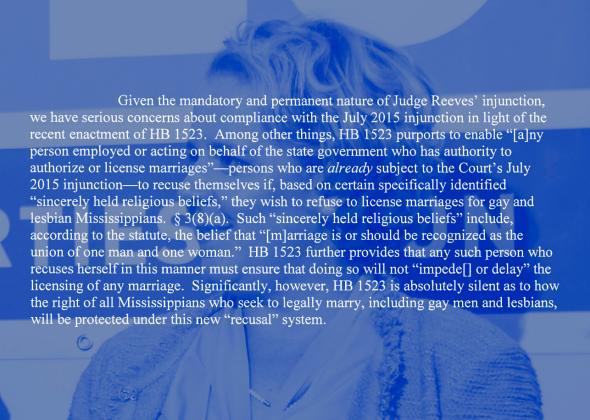When a federal judge struck down Mississippi’s same-sex marriage ban in July, Roberta Kaplan had a simple message: “It’s over.”
It was, in fact, not quite yet over.
Kaplan, who represented Edie Windsor in the litigation that toppled the federal same-sex marriage ban, had barely secured her marriage victory when she turned to Mississippi’s other anti-gay law: The last ban on same-sex adoption in the United States. On April 1, Kaplan won that case, knocking down the Mississippi adoption ban for good.
Four days later, Mississippi Gov. Phil Bryant signed into law the most sweeping anti-LGBTQ legislation in the nation. Mississippi wasn’t quite finished discriminating against its LGBTQ residents. And so Kaplan wasn’t quite finished with Mississippi.
On Monday, Kaplan launched the first legal challenge to HB 1523, Mississippi’s anti-LGBTQ “religious liberty” measure. Rather than taking on the entire law, Kaplan is focusing on one especially troubling section: A provision that allows clerks to recuse themselves from issuing marriage licenses when their “sincerely held religious beliefs” dictate that “marriage is or should be recognized as the union of one man and one woman.” While the law insists that clerk recusal cannot “impede[] or delay” marriage licensing, it doesn’t explain how, exactly, same-sex couples will be protected.
But Kaplan has a trump card. In his July order, United States District Judge Carlton W. Reeves issued a permanent injunction barring all “agents, officers, employees, and subsidiaries” of Mississippi from treating same-sex couples differently from opposite-sex couples. That injunction remains in effect today. As a result, if Mississippi allows a clerk recusal that disadvantages same-sex couples in compliance with HB 1523, it will be in violation of Reeves’ July injunction.
This clever exercise in civil procedure allows Kaplan to avoid mounting a formal lawsuit against HB 1523. Instead, her challenge takes the form of a letter to the governor, attorney general, and registrar of vital records, requesting information relevant to HB 1523. Kaplan is requesting notices for any clerks who plan to recuse themselves and a “full and complete explanation of all steps” recused clerks will take “to ensure that gay and lesbian couples are not impeded or delayed when seeking to marry.” She is also asking “whether the individual seeking recusal intends to continue issuing marriage licenses to straight couples, while at the same time refusing to participate in issuing licenses to gay and lesbian couples.” (Allowing clerks to recuse themselves from licensing same-sex couples while continuing to license opposite-sex couples would constitute de facto segregation, in clear violation of the Equal Protection Clause.)
Kaplan implores Mississippi to “let us know no later than May 2, 2016 whether you will comply with the above request” so she can “evaluate whether we will need to seek further relief” from Reeves. For good measure, the judge is copied on the letter. Reeves, an Obama appointee, has in the past shown little patience for any Mississippi law that, in his words, “perpetuates the false notion of gay inferiority.” If Mississippi cannot demonstrate that HB 1523 will be implemented in a way that complies with Reeves’ injunction, the judge is likely to be receptive to a formal court challenge. And Kaplan won’t rule out such a challenge.
“Our number one laser focus here is to make sure that the injunction is fully complied with,” Kaplan told me on Tuesday. “And we will take whatever steps necessary to make sure that that happens.”
Given Kaplan’s track record, Mississippi would be unwise to bet against her.
